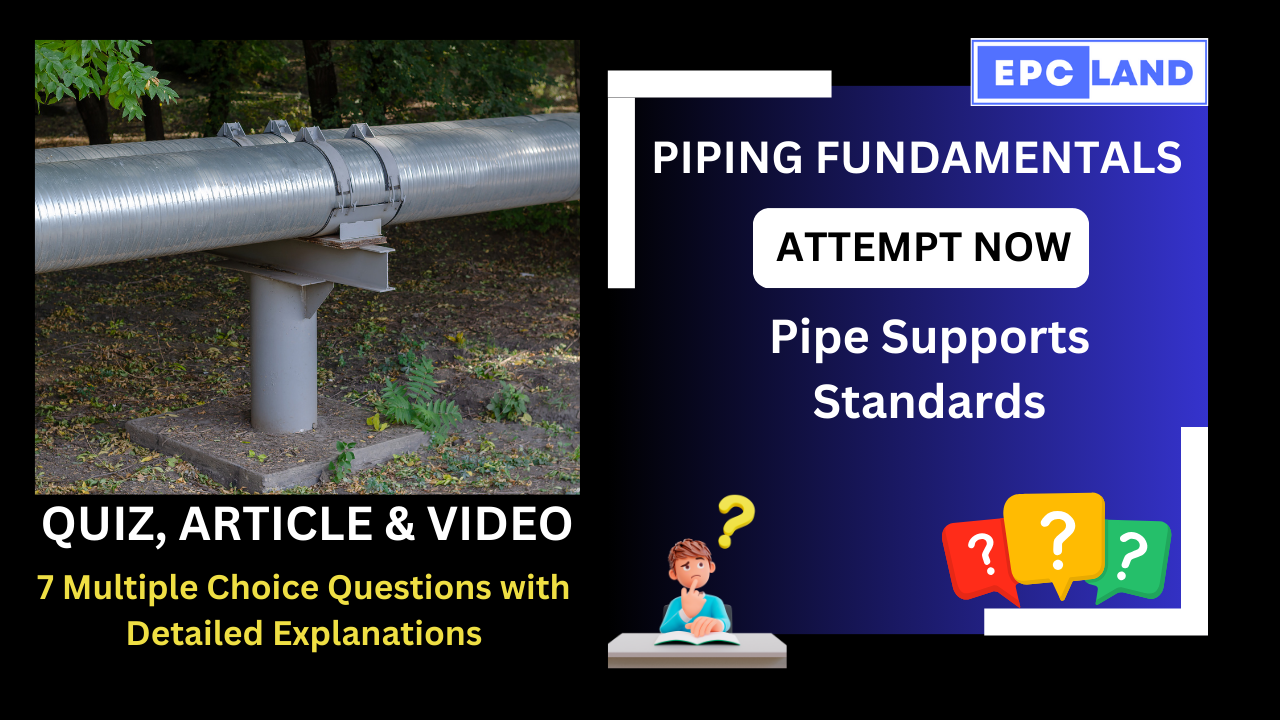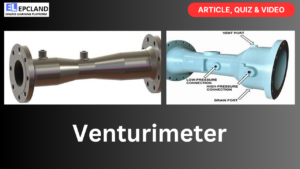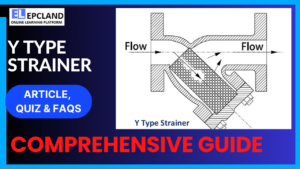1. ASME B 31.3 Clause 321.1.1 as Pipe Supports Standards
What does ASME B 31.3 specify under clause 321.1.1 regarding the layout and design of piping and supporting elements?
Explanation: ASME B 31.3 specifies under clause 321.1.1 that the layout and design should prevent multiple factors including excessive stresses, interference with thermal expansion, and unintentional disengagement.
2. one of the Pipe Supports Standards – MSS SP-58
Which aspect of pipe hangers and supports is covered by MSS SP-58?
Explanation: MSS SP-58 covers materials, design, and manufacture of pipe hangers and supports.
3. Pipe Support Standard – MSS SP-69
What does MSS SP-69 specifically address in the realm of pipe hangers and supports?
Explanation: MSS SP-69 addresses the selection and application of pipe hangers and supports.
4. Pipe Support Standard – MSS SP-77
What is covered by MSS SP-77 in the context of pipe supports?
Explanation: MSS SP-77 provides guidelines for contractual relationships related to pipe supports.
5. Pipe Support Standard – MSS SP-89
What does MSS SP-89 focus on in the realm of pipe hangers and supports?
Explanation: MSS SP-89 focuses on the fabrication and installation practices of pipe hangers and supports.
6. Pipe Support Standard – MSS SP-90
What is the main content covered by MSS SP-90?
Explanation: MSS SP-90 provides guidelines on terminology for pipe hangers and supports.
7. Other Pipe Support Standards
Which ASME standards are mentioned as part of the pipe supports standards?
Explanation: ASME B 31.3 and ASME B 31.1 are mentioned as power piping and process piping standards in the context of pipe supports.
Don’t Miss 20+ Quizzes on Pipe Supports:
Short Article on Pipe Supports Standards
Pipe Supports Standards
Pipe supports are crucial for the safe and reliable operation of piping systems. They play a vital role in preventing various issues and ensuring the integrity of the piping. Several standards and codes guide the design, selection, and installation of these essential components.
ASME B31.3:
This code, specifically clause 321.1.1, outlines the key considerations for piping and its supporting elements. It emphasizes preventing:
- Excessive pipe stresses: Supports must distribute weight evenly to avoid exceeding allowable stress limits.
- Leaks at joints: Unwanted movement and vibration can compromise joints. Supports stabilize the piping, minimizing leaks.
- Excessive thrusts and moments: Equipment like pumps and turbines can be overloaded by excessive forces. Supports help counter these forces.
- Stress in supporting elements: Overloaded supports can fail. Proper design ensures they can handle the imposed loads.
- Resonance: Vibrations from pumps or other sources can damage the piping. Supports can absorb or redirect vibrations to prevent resonance.
- Interference with thermal expansion: Flexible piping needs room to expand and contract. Supports should allow this movement without hindering it.
- Unintentional disengagement: Piping can detach from its supports due to vibration or improper design. Supports secure the piping in place.
- Excessive piping sag: Sagging can lead to stress and damage. Supports maintain proper alignment and prevent excessive droop.
- Distortion or sag in specific materials: Some materials like thermoplastics can creep and deform under repeated thermal cycling. Supports need to be designed accordingly.
- Heat exposure: Supports should be protected from extreme temperatures transmitted through the piping.
Other Standards:
- ASME B31.1 and B31.8: These codes apply to power piping and process piping, respectively, and provide additional guidance on pipe support design and selection.
- MSS SP-58: This standard specifies materials, design, and manufacturing requirements for pipe hangers and supports.
- MSS SP-69: This standard helps select and apply the appropriate pipe hangers and supports based on specific needs.
- MSS SP-77: This standard provides guidelines for contractual relationships related to pipe support systems.
- MSS SP-89: This standard covers fabrication and installation practices for pipe hangers and supports.
- MSS SP-90: This standard clarifies terminology used for pipe hangers and supports.
By adhering to these standards, engineers and designers can ensure that pipe supports effectively perform their critical functions and contribute to the overall safety and reliability of piping systems.
Table of Contents
Don’t miss the Course on Effective Isometrics Management: Check Now
Enrollment Link
Recommended courses (Published on EPCLand)
- Complete Course on Piping Engineering
- Basics of Piping Engineering
- Piping Layout Engineering
- Piping Material Engineering
- Piping Stress Analysis
- Material Requisitions
- Piping Material Specifications
- Valve Material Specifications
- Plant Design & Layouts-OISD 118
- Isometric Management
Library of Technical Articles
Don’t miss out the collection of 15+ articles on following topics:
- Basics of Oil and Gas Industry
- Valves
- Testing
- Tank
- Piping Bulk Items
- Pipe
- Metallurgy
- Piping Materials
- Layout
- Instrumentation
- Heat Exchanger
- Type of Contracts
- Codes and Standards
- ASTM Standards
- Articles on Piping Specialty Items
Video details of Complete Course on Piping Engineering
Why Enroll in the EPCLand
Proven Track Record– PTR
Activities & Achievements before launching EPCLand
- Published more than 50+ short courses
- 3000+ Enrolments
- More than 3,500,00 Minutes of watch hours in the last 2 years
- 4000+ Students in 100+ Countries
- Rating of 4+ out of 5
- 1000+ YouTube Videos
- 8K+ Subscribers
What Students will Learn
- Codes & Standards of the Energy Sector
- Piping Material Engineering
- Piping Layout Engineering
- Stress Analysis
Interesting facts
- All the published courses have been developed by Industry Experts with more than 2 decades of experience
- Content is based on Practical experience and real-time problems.
- Content is designed and organized in such a manner that it can be easily grabbed.
- Complete website, Blogs and Quiz sections are Planned, Designed and published by myself (About me: Atul Singla)
- Complete flexibility of Time & Location, Students can access the content from anywhere & anytime
- Moreover, once enrolled, the content can be access as many times as you want, which helps in understand the fundamentals in a better way.
Conclusion
In conclusion, our courses are meticulously crafted by industry experts with over two decades of hands-on experience. The content is rooted in practical knowledge, addressing real-time problems. The material is thoughtfully designed and organized for easy comprehension. Every aspect, from the website to blogs and quizzes, has been planned, designed, and executed by Atul Singla, ensuring a comprehensive and seamless learning experience. With the flexibility of accessing the content at any time and from any location, students have the freedom to learn on their terms. Furthermore, enrollment grants unlimited access, allowing learners to revisit the material as often as needed, fostering a deep understanding of the fundamentals.



